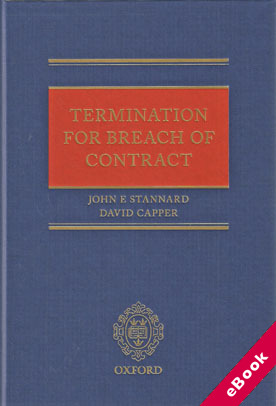We will be closed from 5pm Thursday 17th April for the Easter Bank Holidays, re-opening at 8.30am on Tuesday 22nd April. Any orders placed during this period will be processed when we re-open.

The device(s) you use to access the eBook content must be authorized with an Adobe ID before you download the product otherwise it will fail to register correctly.
For further information see https://www.wildy.com/ebook-formats
Once the order is confirmed an automated e-mail will be sent to you to allow you to download the eBook.
All eBooks are supplied firm sale and cannot be returned. If you believe there is a fault with your eBook then contact us on ebooks@wildy.com and we will help in resolving the issue. This does not affect your statutory rights.
Wildy's Book of the Month: March 2014
Providing a comprehensive and detailed treatment of termination as a remedy for breach of contract, this book gives a current account of the law and explains this complex area in a practical context.
The book is divided into four parts. The first section sets out to analyse what is involved in termination and looks at some of the difficulties surrounding the topic, before going on to explain the evolution of the present law and its main principles.
The second section provides a thorough analysis of the two key topics of breach and termination. Breach is defined in terms of a failure, without good excuse, to perform an obligation under the contract, and the various aspects of this definition are explained in the light of the relevant authorities. In the following chapter in the section, termination is defined in terms of an election by the promisee, in consequence of a breach by the promisor, to claim discharge from his or her own primary obligations under the contract. This process, which can also be seen as a major contractual remedy in its own right, is distinguished from other processes with which it has a close relationship, most notably the right to withhold performance and discharge under the doctrine of frustration.
The third section addresses the question when the right to terminate for breach arises. The law gives two answers to this question - when the term broken is classified as a 'condition' or when a 'fundamental' breach has occurred. The nature of a 'condition' in this sense is explained, and the criteria for identifying when a term should be classified as such is set out. Similarly, the criteria for identifying a fundamental breach is discussed, as is the difficult relationship between the concepts of fundamental breach and repudiation and the doctrine of anticipatory breach.
The fourth and final section considers the consequences of the promisee's election whether to terminate or not. In this section the legal effects of termination with regard to the obligations and remedies available to the promisee and the promisor, and also its effect on the application of other terms in the contract such as exemption clauses, are analysed. The measure of damages available to the promisee following termination, most notably damages 'on the footing of repudiation' or damages for 'loss of the bargain' is also considered here alongside other general principles governing damages in this context.
The final chapter examines the legal consequences of affirmation, once again both with regard to the promisee and the promisor, with particular emphasis on the extent of the promisee's right to enforce the performance of the contract by way of an action for an agreed sum or an action for specific performance.